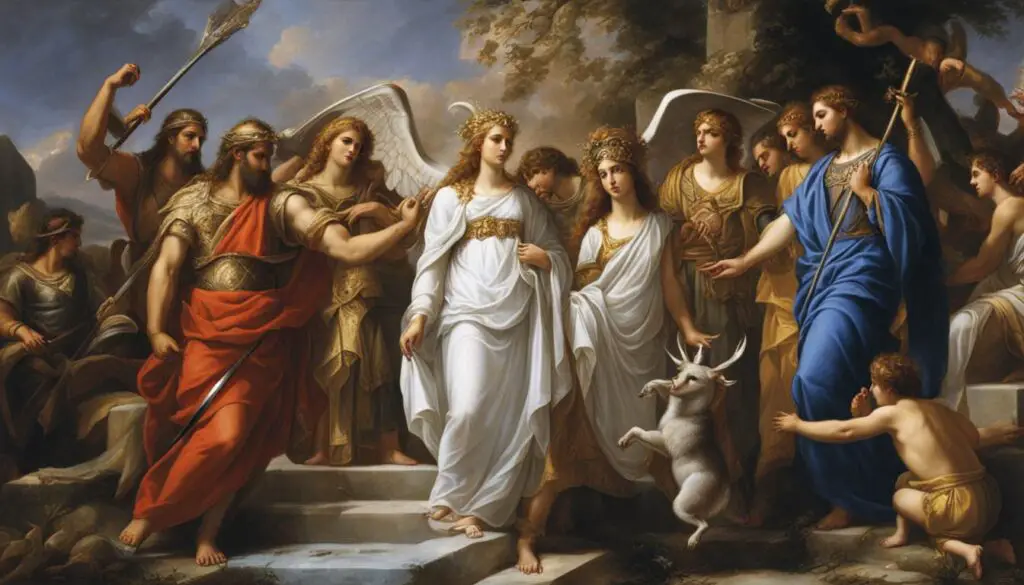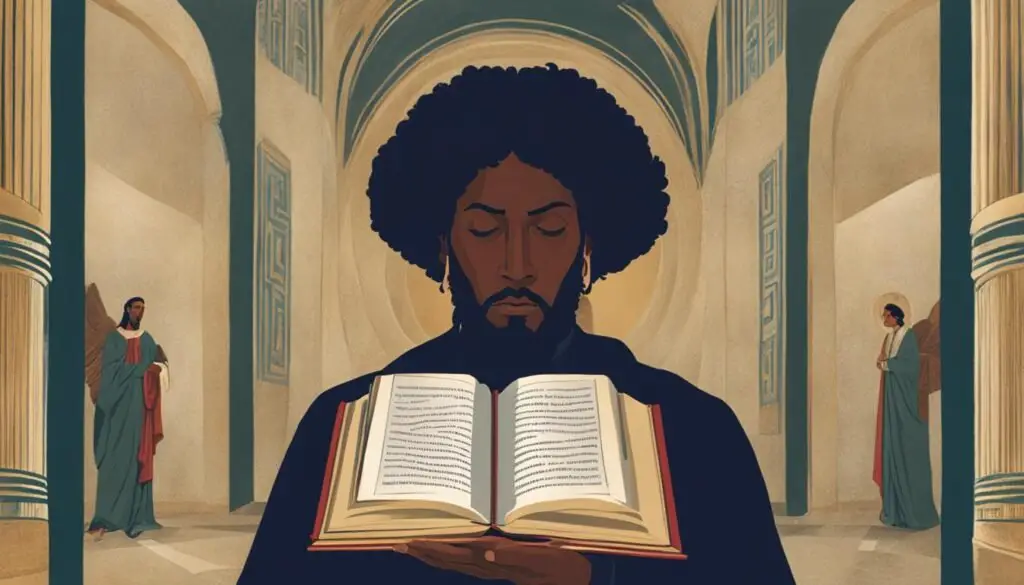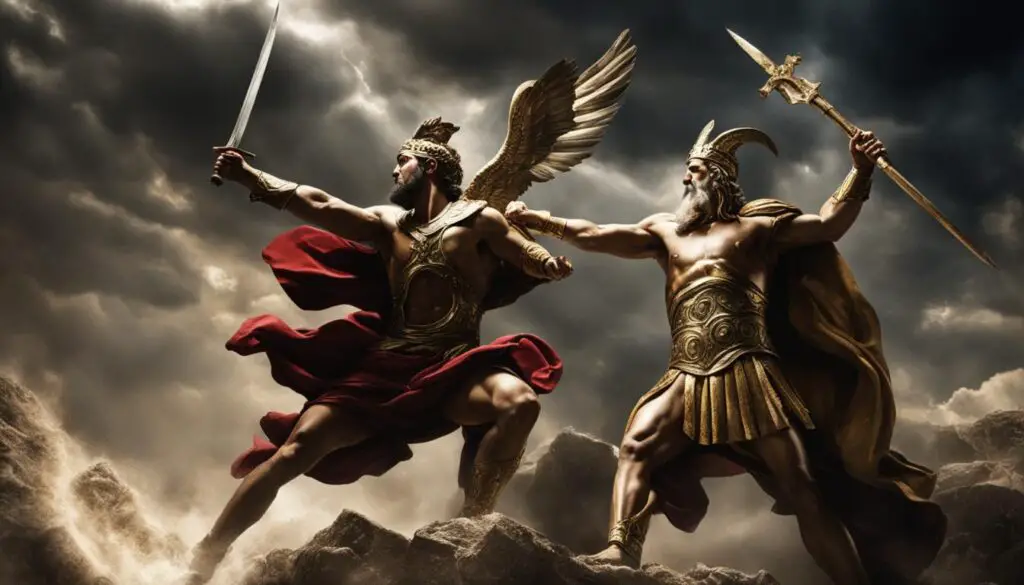Greek mythology and Christianity are two belief systems that have had a significant impact on Western culture. In this article, we will delve into the question of whether Greek mythology goes against Christianity or if there are contradictions between the two. We will explore the origins of Greek mythology, its role in ancient societies, and its influence on Christian beliefs. Join us on this enlightening journey as we uncover the relationship between Greek mythology and Christianity.
Key Takeaways:
- Greek mythology and Christianity have contrasting beliefs and teachings.
- Greek mythology emerged from the ancient Greek culture and religion.
- Christianity worships one true God, while Greek mythology worships multiple gods and goddesses.
- Greek mythology has had an impact on Christian art, literature, and philosophy.
- Studying mythology in a Christian context can provide insights into human nature and belief systems.
The Origins of Greek Mythology
Greek mythology is a fascinating body of stories that has captivated audiences for centuries. To truly understand its origins, we need to explore the cultural context in which it emerged. The myths and legends of ancient Greece were influenced by a combination of shared cultural ancestry and interactions with neighboring civilizations.
One of the key factors in the origins of Greek mythology is the concept of cultural ancestry. According to ancient Greek beliefs, all civilizations descended from the people who built the Tower of Babel, and these people carried with them a shared heritage of stories and traditions. As these civilizations interacted through trade and cultural exchange, their myths and legends began to intertwine and evolve.
Shared Themes in Ancient Myths
Another important aspect of Greek mythology’s origins is the presence of shared themes with other ancient myths. Many ancient cultures had stories about the creation of the world, the gods and goddesses who ruled over it, and the epic battles that took place. These common themes suggest a collective human desire to understand the world and our place in it.
- Creation stories: The Greeks, like many ancient cultures, had myths about the creation of the world. The most famous of these is the story of Gaia, the primordial Earth goddess, and Uranus, the sky god.
- Godly conflicts: Greek mythology is full of stories about gods and goddesses clashing with each other, just like in other ancient myths. These conflicts often represented the struggle between different forces of nature or the human condition.
- Heroic quests: Many ancient myths, including Greek mythology, feature heroic quests undertaken by mortals. These quests serve as a metaphor for the challenges and trials that humans face in their own lives.
By understanding the origins and shared themes of Greek mythology, we can gain a deeper appreciation for its cultural significance and enduring appeal. It is a testament to the universal human desire for meaning and our ongoing fascination with stories that explore the mysteries of the world.
Greek Mythology as a Belief System

The worship of Greek gods and goddesses was not merely a fictional concept in ancient societies; it was an essential part of their religious belief system. The Greeks, as well as other cultures influenced by Greek mythology, revered and feared these deities, attributing power to them over various aspects of their lives. The gods and goddesses were seen as active participants in the world, responsible for natural phenomena, human suffering, and even the afterlife.
The myths of Greek mythology provided explanations for the origins of the world, the existence of storms and other natural disasters, and the hardships that humanity faced. These stories served as a cultural framework for understanding the complexities of life and the human condition. People sought the blessings and protection of the gods through rituals, sacrifices, and prayers, believing that their actions would guarantee favor and avoid divine punishment.
Greek Mythology in Ancient Societies:
- The belief in Greek gods and goddesses was prevalent throughout ancient Greek society, influencing various aspects of daily life, including politics, art, and literature.
- Temples and sanctuaries dedicated to specific deities were built, and regular religious festivals were held to honor and appease the gods.
- Greek myths were retold orally and passed down through generations, reinforcing the religious beliefs and cultural identity of the people.
- Individuals looked to the gods for guidance in making important decisions and sought divine intervention in times of crisis.
The worship of Greek gods and the belief in their power shaped the worldview of ancient societies, providing a sense of meaning, purpose, and order in a chaotic and unpredictable world.
As we continue to explore the relationship between Greek mythology and Christianity, it is important to understand the significant role that Greek mythology played in the lives of ancient societies. The worship of Greek gods and goddesses was not a mere collection of mythical tales; it was a deeply ingrained belief system that shaped the culture, art, and religious practices of the time.
Contrasts and Conflicts
When comparing Greek mythology and Christianity, it becomes evident that there are significant contrasts and conflicts between the two belief systems. While both entail storytelling and the presence of supernatural entities, their core principles and values diverge greatly.
1. Polytheism versus Monotheism
One of the most prominent differences is the worship of multiple gods in Greek mythology versus the worship of one true God in Christianity. Greek mythology celebrates a pantheon of fallible gods and goddesses who often exhibit immoral behavior. In contrast, Christianity believes in the worship of an incorruptible and morally perfect God.
2. Focus on Human Pride versus Humility
Greek mythology often revolves around human pride and the dire consequences of defying the gods. The myths serve as cautionary tales, highlighting the perils of arrogance and hubris. In contrast, Christianity emphasizes humility, repentance, and redemption. It encourages believers to acknowledge their limitations and seek forgiveness.
3. The Role of Fate versus Free Will
Greek mythology often portrays human fate as predetermined and inescapable, subjecting individuals to the whims of powerful deities. Christianity, on the other hand, emphasizes the importance of free will and personal choices. It teaches that individuals have the ability to make moral decisions and shape their own destinies.
These contrasts and conflicts between Greek mythology and Christianity highlight their fundamentally different approaches to understanding the world, human nature, and the divine. While Greek mythology focuses on the fallibility of gods and the consequences of mortal actions, Christianity emphasizes the divine perfection of God and the redemption of humanity through faith and repentance.
Influence on Christian Beliefs
Greek mythology has had a profound influence on Christian beliefs throughout history. During the Renaissance period, Greek mythology served as a rich source of inspiration for artists, writers, and philosophers. The myths and stories provided a cultural framework for understanding the world and exploring complex themes. Renaissance scholars studied and incorporated elements of Greek mythology into their works, infusing them with symbolism and meaning.
Despite the incorporation of Greek mythology into Christianity, there have been debates and controversies surrounding its impact on the faith. Some Christians have viewed the integration of Greek myths as conflicting with their religious beliefs. However, it is important to recognize that the influence of Greek mythology on Christianity goes beyond mere storytelling. The symbolism and archetypes found in Greek myths have contributed to the development of Christian thought and creative expressions.
The incorporation of Greek mythology into Christianity has allowed for a deeper exploration of human nature and the complexities of belief systems. By studying and understanding mythology in a Christian context, we can gain valuable insights into the historical and cultural context of ancient societies. This knowledge enables us to engage in informed conversations about faith and belief, fostering a deeper appreciation for our cultural heritage and the ongoing search for spiritual truth.
The Impact of Greek Mythology
- Rich source of inspiration for artists, writers, and philosophers during the Renaissance period
- Provided a cultural framework for understanding the world and exploring complex themes
- Contributed to the development of Christian thought and creative expressions
- Allows for a deeper exploration of human nature and belief systems
- Enables informed conversations about faith and belief
- Fosters a deeper appreciation for our cultural heritage and the ongoing search for spiritual truth
Teaching Mythology in the Christian Context

When it comes to teaching mythology in a Christian education setting, there are several benefits to consider. By incorporating the study of mythology into the curriculum, students can gain a deeper understanding of ancient cultures and their beliefs. This can lead to a greater appreciation for the historical context of biblical texts and a more nuanced view of the world in which Christianity emerged.
One of the key benefits of studying mythology is the opportunity it provides for critical thinking and analysis. By comparing and contrasting the beliefs and lessons of mythology with Christian teachings, students can develop their analytical skills and explore the complexities of different belief systems. This can deepen their understanding of human nature and the universal themes that underpin various religious traditions.
The Benefits of Studying Mythology in a Christian Education Setting:
- Enhances cultural literacy: Mythology is an integral part of Western cultural heritage, and studying it can provide students with a broader understanding of the literary and artistic traditions that have shaped our society.
- Promotes empathy and tolerance: By studying different belief systems, students can develop empathy for diverse perspectives and learn to respect the religious beliefs of others.
- Encourages critical thinking: Comparing mythology with Christian teachings allows students to critically analyze and evaluate different worldviews, strengthening their analytical and reasoning skills.
- Expands creativity and imagination: Mythology is a treasure trove of inspiring stories and characters that can fuel students’ creativity and imagination, helping them develop their own artistic and literary abilities.
It is important to note that teaching mythology in a Christian context should be done with sensitivity and guidance. Educators should ensure that the study of mythology aligns with Christian values and is presented in a way that promotes understanding rather than conflicting beliefs. By approaching mythology from a Christian perspective, students can engage in meaningful discussions about faith and belief, and develop a deeper appreciation for the rich tapestry of human spirituality.
Does Greek Mythology Go Against Christianity?
The relationship between Greek mythology and Christianity is a topic that sparks discussions and debates among scholars and believers. While there are clear contrasts and conflicts between the two belief systems, it is essential to approach this topic with an open mind and a respect for the cultural significance of Greek mythology.
When we examine the religious conflicts between Greek gods and Christianity, we find that Greek mythology portrays a pantheon of fallible deities who often exhibit immoral behavior. In contrast, Christianity believes in the worship of one perfect and incorruptible God. The myths of Greek mythology center around human pride and the consequences of defying the gods, while Christianity emphasizes humility, repentance, and redemption.
Despite these disparities, it is important to note that Greek mythology holds historical and cultural value. By studying and understanding mythology in a Christian context, we can gain a deeper appreciation for our cultural heritage and engage in informed conversations about faith and belief. Greek mythology serves as a reminder of the human quest for meaning and the ongoing search for spiritual truth.
In conclusion, the question of whether Greek mythology goes against Christianity is complex and nuanced. While there are religious conflicts between Greek gods and Christian beliefs, it is crucial to approach this topic with respect and a willingness to explore the historical and cultural aspects of Greek mythology. By doing so, we can foster a deeper understanding of our own faith and engage in meaningful conversations about the human experience.
FAQ
Does Greek mythology contradict Christianity?
Greek mythology and Christianity have significant differences and conflicts, particularly in their beliefs about the nature of gods and moral behavior. Greek mythology worships fallible gods and goddesses who exhibit immoral behavior, while Christianity believes in one incorruptible and morally perfect God. However, it is important to recognize the cultural significance and historical impact of Greek mythology.
How did Greek mythology influence Christian beliefs?
Greek mythology had a significant impact on Christian beliefs, especially during the Renaissance period. Renaissance scholars incorporated elements of Greek mythology into their works of art, literature, and philosophy. Greek mythology served as a source of inspiration and provided a cultural framework for understanding the world.
Can Greek mythology be taught in a Christian context?
Yes, the teaching of mythology, including Greek mythology, can have value when set in a Christian context. By providing students with a proper understanding of mythology and its role in ancient cultures, educators can foster a deeper understanding of historical and literary texts. Comparing and contrasting the beliefs and lessons of mythology with Christian teachings can help develop critical thinking skills and insights into belief systems.
What is the relationship between Greek mythology and Christianity?
Greek mythology and Christianity have distinct differences and conflicts. Greek mythology worshiped a pantheon of fallible gods and goddesses, while Christianity centers around the worship of one true God who is morally perfect. Despite these conflicts, the rich symbolism and storytelling of Greek mythology continue to influence Christian thought and creative expressions.
Is there a conflict between Greek gods and Christianity?
Yes, there is a conflict between Greek gods and Christianity. Greek mythology features gods and goddesses who exhibit immoral behavior and often focus on human pride and its consequences. In contrast, Christianity emphasizes humility, repentance, and redemption in its teachings. The conflicting beliefs and characteristics of Greek gods and Christian principles highlight the differences between the two belief systems.




